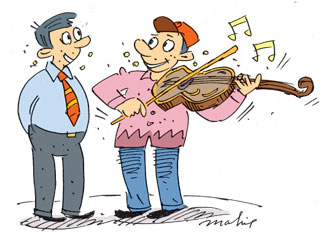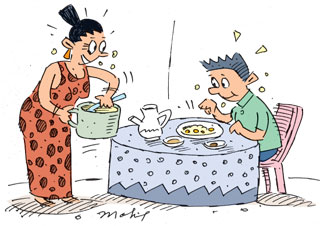|

by R. S. Karunaratne
Use of 'some' and 'any'
'Some' and 'any' can be used with uncountable and plural nouns
without making any big difference in meaning.
We need some butter.
Drink some water.
|

The violin is a difficult instrument to play. |
I want to buy some sugar.
Some people are waiting at the gate.
Some of the eggs are rotten.
Some children are well behaved.
'Any' is used mostly in questions and negative sentences.
Do you have any books on economics?
Did you see any boys in the class?
They did not bring any presents.
We don't have any furniture in the house.
She did not buy any books at the exhibition.
'Some' or 'any' are used when we think of a limited number.
I want to buy some curtains.
There were some people at the meeting.
Some suspects have been arrested.
Is there any water in the tank?
Now you don't need any spectacles.
Similarly, we do not use any article when we think of a limited
number, or when we think of unlimited numbers.
I love roses. (No mention of number)
She doesn't like dogs.
There were leaves on the floor, on the roof and on the stage. (A
large number)
Would you like some rice? (A limited amount)
When we talk in general we do not use articles.
Eggs are expensive during festivals.
Books are cheap in India.
Life is a constant struggle.
It is not easy to fit in with society.
We must protect nature.
Laika was the first animal that travelled into space.
By using 'the' with a singular countable noun, we can talk about
things in general.
|

Would you like some rice? |
The cow is a useful animal.
The telephone has revolutionised communication methods.
The violin is a difficult instrument to play.
The elephant is in danger of becoming extinct.
We do not use articles with common expressions relating to places,
time and movement.
She is going to school.
We are returning from church.
He is still in prison.
With place nouns, expressions with or without articles will have
different meaning.
I met her at university. (When we were undergraduates).
Can we meet at the university? (meeting place)
Mother is in hospital. (as a patient)
I'm going to see her at the hospital.
In American English, however, articles are used with hospital,
college and university.
I was unhappy at the university
Most patients do not like to stay in the hospital.
'The' is dropped after 'both'.
Both children attend the same school.
We leave out 'the' after 'all'.
All four suspects were produced in court.
'The' is usually dropped after the amount or number of.
I am surprised at the amount of money he has collected.
The number of unemployed graduates is rising, steadily.
'Man' and 'woman' can be used in a general sense without articles.z
Man is a rational animal.
Woman has the same rights as man.
Current English usage
As a living language, English is subject to change from time to time.
Therefore, be familiar with the current English usage.
1. Facetious means 'humorous or flippant.'
Note all the vowels - a.e.i.o.u. - appearing in the alphabetical
order. She was a facetious young woman who does not take anything
seriously.
2. Facility and faculty.
Facility means 'skill in doing something. I admire your facility with
words.
Faculty means 'natural talent or power. She has a faculty for
learning French.
Facilities refer to equipment or buildings. The college has sports
facilities. It also means 'toilet'. Can we use your facilities for a
week?
3. Faint and feint
As an adjective Faint means 'not clear.' I hear a faint noise. As an
adjective feint means 'with faintly printed fine lines.'
4. Fait accompli (pronounced 'fayt a-komplee')
The French phrase adopted into English means 'something that has been
done and cannot be undone.' The parents did not approve of her marriage
to Peter. But they could not do anything about it because it was a fait
accompli.
5. Fantastic literally means 'fanciful or strange.' However, in
modern usage it means 'excellent'. We had a fantastic holiday at Ranmal
Resort. It also means 'very large.' I had to pay a fantastic sum of
money to buy the new house in Colombo 7.
6. Farther and further
Farther refers to physical distance. Kandy is farther from Colombo
than Kadawatha. Further refers to time or extent. The contractor wants
further time to complete the house. As a verb further means 'to help the
progress about.' They did everything to further the cause of freedom.
7. Fascinate means 'to capture the attention of.' I was fascinated by
the princess's beauty. Note the 'sc' combination.
8. Fatal and fateful
Fatal means 'causing or ending in death.' Two children died in the
fatal accident. AIDS is a fatal disease. Fateful means 'important and
decisive.' Nobody knew what to do in that fateful night.
9. Faux pas (pronounced 'foe pa') is a French phrase now used in
English. It means a 'social blunder.' When she introduced herself as
Miss Browns, the interviewer made a faux pas by asking whether she was
married.
10. Fax is an abbreviation of 'facsimile.'
It means 'an electronic system for transmitting documents using
telephone lines.' As a noun fax refers to a machine that transmits
documents. |

